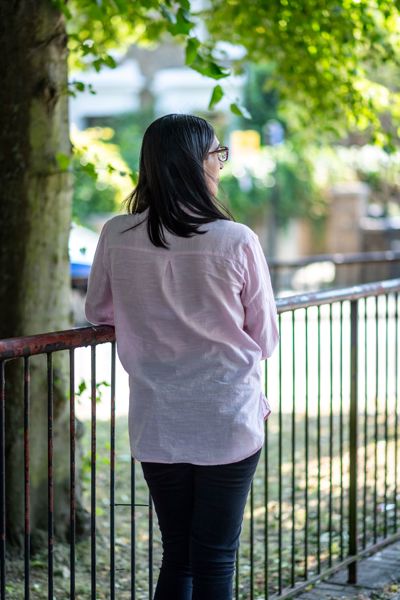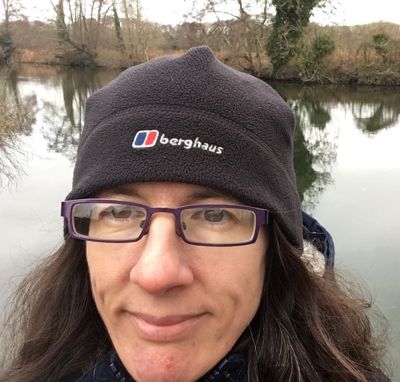“I finally have my spark back” – Cara’s story
20/06/2024
During university, Cara experienced psychosis for the first time. After a suicide attempt and multiple hospital admissions, Cara was supported by the Early Intervention team. She now works as a student mental health nurse and is the happiest she’s ever been.
I was 19 in my second year at university when I was first diagnosed with anxiety and depression by a GP. If I’m honest, I was a little confused. I’d always considered myself to be the loud, confident, ‘life and soul of the party’, and hadn’t experienced any mental health problems before. But my housemates dragged me to the GP, noticing I wasn’t quite the same.
I was isolating myself, sleeping all the time and was generally a bit unpredictable. The GP prescribed me some anti-depressants, I felt a bit better and continued on. However, towards the end of my third year, I experienced a traumatic event which eventually led to developing psychosis and being diagnosed with PTSD (post-traumatic stress disorder).
The first time I experienced hearing ‘voices’ was when I was sitting in an empty train carriage. It was surreal, and the only reason I knew the ‘voices’ weren’t real was because I looked around and there was no-one there. My initial reaction was ‘oh my god, I’ve gone crazy, I can’t tell anyone about this’. This was due to the fear and confusion about what was happening and what people might think.
-
I was convinced my food was poisoned and that people were following, spying and filming me.
Unfortunately, a few days later I made an attempt on my life. Luckily, I survived and I was seen by the home treatment team and admitted into hospital. During this admission, I opened up about hearing voices but was dismissed and eventually discharged on medication, with a lack of support. It was a completely confusing, isolating and lonely period of my life, and I had no idea what my future would hold.
I declined quickly back in the community, which eventually led to a second inpatient admission. This time I was sectioned. I was at my darkest point, I couldn’t see a way out of the suffering and I couldn’t make the ‘voices’ stop. However, the ward team listened to my experiences and referred me to an Early Intervention team for psychosis.
It was at this point when I first heard the term ‘psychosis’. Whilst this was daunting to hear, I finally had an explanation for what was happening to me. At 21, my first thought was: what does this mean for my future? However, the Early Intervention team explained what was happening to me and why, and what the future might look like. They provided me with hope that I wouldn’t always feel the way I did.
-
The first time I experienced hearing ‘voices’ was when I was sitting in an empty train carriage.
I worked closely with my psychiatrist and ward staff to find a medication regime and coping strategies. For me, these were music, exercise, playing Scrabble and showering when the voices were too intense. After several months, I was discharged back into the community, and even started my first proper job.
However, during the pandemic, I struggled. I lost many of my coping strategies, like the gym, and isolation from people really affected me. I relapsed. This time the psychosis was different. I experienced paranoia and lost touch with what was happening in the world around me. I was convinced my food was poisoned and that people were following, spying and filming me.
I couldn’t understand why no-one believed me when I told them what was happening and I became very angry. This led me to being sectioned for my third and final inpatient stay. I was put on antipsychotic medication which stabilised me. The paranoid thoughts and ‘voices’ reduced.
-
I am the happiest and healthiest I have ever been, something I never thought would happen.
In the community, I was given EMDR (eye movement desensitization and reprocessing) therapy, where I learnt to process my experiences, feelings and early warning signs. I went from strength to strength to strength, and was eventually discharged from Early Intervention and mental health services. I no longer take psychiatric medication.
I am now a student mental health nurse, having learnt from my experiences, and try to give hope to other people that things can change and get better. I still prioritise my mental health, exercising regularly, ensuring I leave the house every day and continuing to socialise with friends.
Someone told me a few months ago that I finally have my ‘spark’ back and they were right. I am the happiest and healthiest I have ever been, something I never thought would happen. If I could say anything to anyone struggling, it would be don’t lose hope and please don’t suffer in silence. The expression ‘a problem shared is a problem halved’ is so commonly used, but it is absolutely true.



